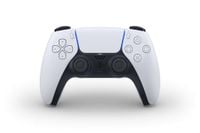Sony Interactive Entertainment is making waves in the gaming world with a recently discovered patent that points to the possible development of a solar-powered PlayStation controller. This innovative concept aims to tackle one of the most significant issues gamers face today: controller battery life.
According to Tech4Gamers, the patent includes detailed plans for a PlayStation controller equipped with a plurality of photovoltaic elements embedded in its housing. These elements would allow the controller to harness solar energy, providing a sustainable power source and enhancing the gaming experience by potentially eliminating the need for frequent recharging.
Launched in November 2020 alongside the PlayStation 5, the DualSense wireless controller has been praised for its groundbreaking features but criticized for its short battery life, often lasting only about 12 hours or less. This limitation has caused frustration among gamers, especially during lengthy gaming sessions, where unexpected loss of power can spoil the experience. The newly proposed controller could change this narrative entirely.
Images accompanying the patent filings showcase a design that resembles the current DualSense controller, indicating that Sony is looking to build upon its existing technology. With these "photovoltaic elements," the controller could potentially recharge simply by being in sunlight, a prospect that might significantly alter the way players interact with their gaming devices.
But while the concept sounds promising, there are still many unanswered questions. For instance, how efficient would the solar charging be indoors, if gamers spend most of their time in artificially lit environments rather than basking in natural sunlight? Would a controller need to be placed in direct sunlight to recharge effectively, or could it charge at all under regular indoor lighting conditions?
Another concern is the practicality of integrating solar technology into a controller that already features a number of intricate components, which may limit space for these new innovations. The light-gathering capabilities of such photovoltaic materials will likely dictate their effectiveness, potentially making designs highly dependent on the conditions where the users usually play.
Sony is not alone in this quest for innovative gaming technology. Microsoft is also exploring enhanced functionalities for its own controllers. For instance, a patent for a new haptic feedback system has been suggested, rivaling the DualSense's features. Meanwhile, Sony’s recent patents include exciting features like a rewind option that allows players to bookmark sections of games, adding yet another layer of convenience for gamers.
Within the context of patents filed across the industry, it is important to note that while the technology for a solar-powered controller is fascinating, many patents never transition into actual products or take years to fully develop. For example, the idea of a controller that could intrinsically detect the environment and react accordingly might still be just a dream at this point.
"It sounds like a fantastic idea on paper, though we'll leave it to Sony to figure out how to make it all work practically," said a publication reporting on the patent. The leap from patent to a fully functional product is fraught with challenges, especially for novel technology like this, where technical feasibility and costs can severely hinder development efforts.
Nevertheless, Sony's engagement with solar technology reflects an industry-wide push toward sustainability and efficiency. Gamers have been known to invest heavily in improvements that result in better performance and more enjoyable gaming sessions, so a controller that could charge using sunlight would likely be well-received.
As we look to the future, it remains to be seen what timelines Sony has in mind for bringing such technology into the mainstream. For now, industry experts and gaming enthusiasts alike are left speculating about the possibilities. The idea of playing video games without worrying about battery life has its appeal; however, the realization of this innovation may still be quite some time away.
Overall, Sony's venture into solar-powered controllers represents a potential step towards revolutionizing how gamers power their devices while also contributing to a more environmentally friendly gaming ecosystem. Still, the question of whether this idea will materialize into a retail product is left very much up in the air.
As with most innovations in tech, passionate gamers will be watching closely, hoping that Sony's explorations lead to tangible improvements in the gaming experience and that we can one day game under the sun without a worry.








